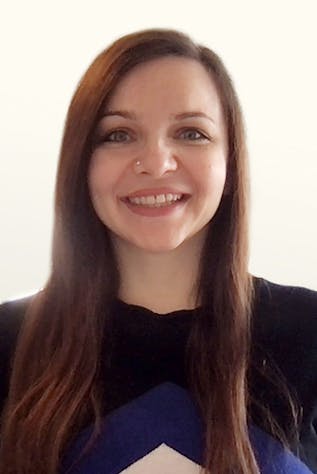.tech Podcast - Supporting diversity in tech
Blogs· 5min July 27, 2022
Leah Cohen from School of SOS joins us to share her insights into how tech leaders can support diversity in tech. She tells us about what diversity in tech is and why we should care about it. Then, she explains two key solutions to improving diversity: target the next generation and support transitioning into careers in tech.
Thoughts on tech leadership
Leah Cohen is Chief Technology Officer (CTO) at School of SOS. She has a background as an entrepreneur, developer and is now in charge of building the platform and leading the technical team at School of SOS.
Leah defines adaptability as the most important quality of good tech leaders. Every team has its own challenges and there is no "one size fits all" to leadership. As a people leader, you can rely on your experience, but adaptability will allow you to tailor your style to your team.
Tech leadership isn't just about sitting at the top and making tech decisions. Good people leaders need to motivate and support their team.
They sit between the tech team and the business, helping the tech team understand what the needs of the business are and vice versa. As a leader you need to work as a bridge between engineering and business, so they must be effective communicators as well.
While often overlooked, the people aspect of startups is the key to scaling the business and the team.
What is diversity?
Diversity is talked about a lot, so it's important to begin by defining it.
Leah begins discussing diversity in tech from a product perspective. Women are the dominant consumers, but men are the ones building product. You need a breadth of types of people in your team so that you can understand a variety of user perspectives and build better products that work for everyone. Diverse teams should challenge their leaders viewpoints and assumptions, rather than just agree with you. This exchange of ideas from people with different backgrounds leads to better products.
It is well established that tech has a diversity problem. There are a lot of misconceptions around what a tech team and tech role looks like. As Leah pointed out, being successful in tech involves a lot more personal skills than previously. The idea of someone sitting in the corner and coding by themselves is antiquated. Tech is a very collaborative field, where you have to work and communicate with other people to succeed.
Improving diversity
On the other side, solving the history of the diversity problem in tech is difficult. It is daunting to enter an industry where you stick out, so the diversity problem is in a way self perpetuating. Minorities don't want to enter tech because there are no minorities in tech.
An obvious solution is to target the next generation. Leah is passionate about going to schools and inspire girls to consider careers in tech, whether engineering or science or any other form of tech.
Traditionally, the way that tech was taught in schools was very detached from real world problems. Supporting organisations to set up and start building real products will be more fun and enticing for kids. At Form3, we support Stemettes, an organisation which inspired and supports girls who want to learn more about STEM. As engineers, we all have a responsibility to support the next generation.
However, Leah explains that it's really tricky to influence the education system. The way that the curriculums are designed and the subjects are graded actually turns away minorities. For example, girls are traditionally brought up to be perfect, especially the millennial generation that is now in the workforce. Such a huge part of engineering is trying and failing, until you get something working. Girls are typically afraid to fail and not be perfect in front of others.
Another solution is to support transitioning into careers in tech. Opening up more pathways for people to change careers into tech is another way we can begin to improve diversity. Moving to tech from non-traditional backgrounds is key because it allows us to bypass the hurdles of the tech education.
Tech leaders can support those who want to transition into tech by giving them different forms of assessment, whether they prefer to take their task in person or with a take home task. This will allow people to perform their best in the format they're most comfortable with.
Supporting minorities
Anyone that has the time and ability to create organisations that support minorities is a super star in our book.
Tech leaders should support these organisations in any way they can. For example, Women of Silicon Roundabout is a wonderful tech conference aimed at women.
Apprenticeship programs are another brilliant way to bring in juniors and start training them. Online bootcamps are also a way that people can build up their tech skills alongside their day job. Hiring people from non-traditional backgrounds where we can is a great way to support diversity.
Women mentoring women
You can feel free to reach to either of the people on this podcast if you want to learn more about getting into tech.
Nobody comes up where they are alone. Leah would like to thank Bonnie Lister Parsons, founder & CEO of School of SOS, as well as Jonathan Lister Parsons. They have both been huge supporters for her through this transition into being a CTO
Don't hesitate to get in touch with Adelina Simion, Technology Evangelist at Form3, and our super star guest, Leah Cohen.
Written by
Adelina is a polyglot engineer and developer relations professional, with a decade of technical experience at multiple startups in London. She started her career as a Java backend engineer, converted later to Go, and then transitioned to a full-time developer relations role. She has published multiple online courses about Go on the LinkedIn Learning platform, helping thousands of developers up-skill with Go. She has a passion for public speaking, having presented on cloud architectures at major European conferences. Adelina holds an MSc. Mathematical Modelling and Computing degree.
Further resources
Blogs · 10 min
Dangling Danger: Route53's Flawed Dangling NS Record Protection
A subdomain takeover is a class of attack in which an adversary is able to serve unauthorized content from victim's domain name. It can be used for phishing, supply chain compromise, and other forms of attacks which rely on deception. You might've heard about CNAME based or NS based subdomain takeovers.
October 27, 2023
Blogs · 4 min
Applying the Five Ws to Incident Management
In this blogpost, David introduces us to the five W's of information gathering - Who? What? When? Where? Why? Answering the five Ws helps Incident Managers get a deeper understanding of the cause and impact of incidents, not just their remedy, leading to more robust solutions. Fixing the cause of an outage is only just the beginning and the five Ws pave the way for team collaboration during investigations.
July 26, 2023
Blogs · 4 min
.tech Podcast - All about conference speaking
Patrycja, Artur and Marcin are engineers at Form3 and some of our most accomplished speakers. They join us to discuss their motivations for taking up the challenge of becoming conference speakers, tell us how to find events to speak at and share their best advice for preparing engaging talks. They offer advice for new and experienced speakers alike.
July 19, 2023












